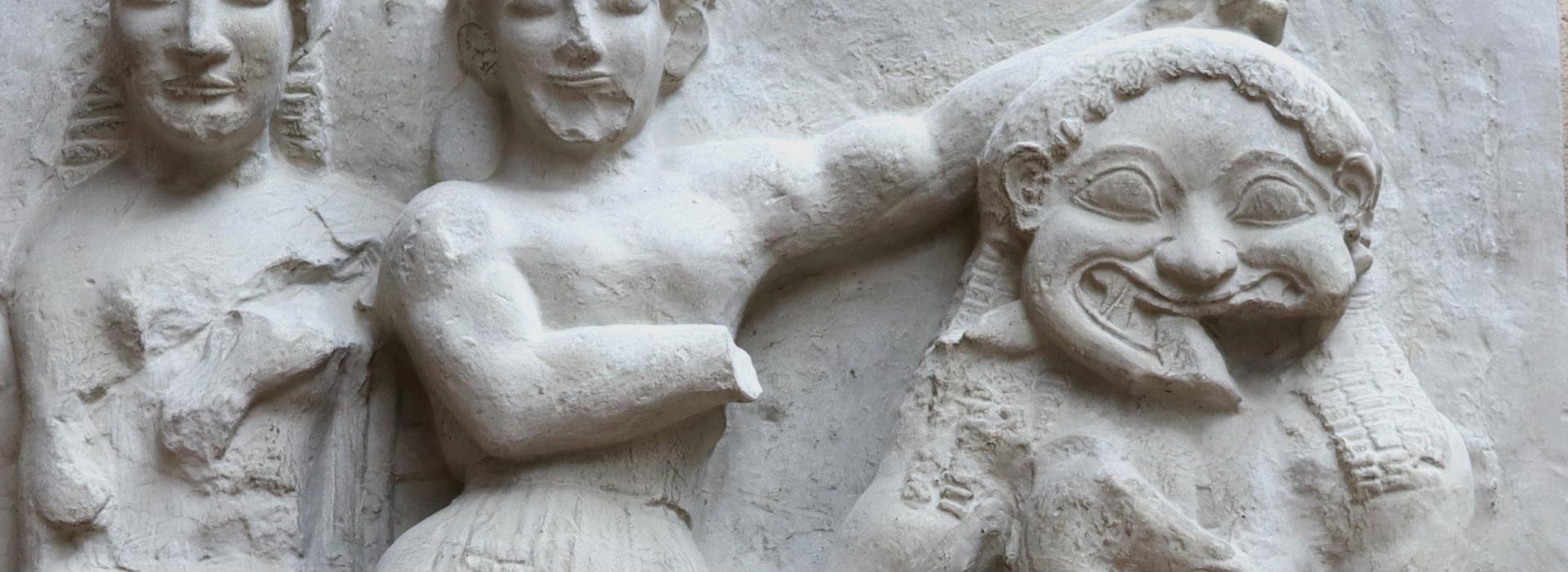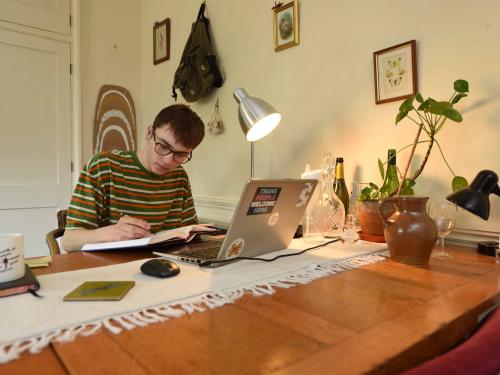Breadcrumb
Classics
The Classics course at Cambridge allows you to study the literature, history, culture, archaeology, art, philosophy and linguistics of classical antiquity, incorporating the study of original texts and artefacts. You can either specialise in a particular field or retain the breadth with which the course starts.
More information on the course can be found on the University and Faculty websites.
Classics at Peterhouse
Peterhouse does not operate a fixed quota of places in Classics, but tends to admit 2 students each year, and we accept applications for the three-year and four- year course. More information about the course can be found on the University website. Peterhouse has two Fellows in Classics: Dr Nicholas Zair, who specialises in classical linguistics, and Dr Daniel Sutton, who is an ancient historian.
Course Requirements
Three-year course
Applicants to the three-year course are expected to be studying Latin or Classical Greek to A level or equivalent. Most applicants will be studying Latin A level; for those with only Greek we may advise taking the four-year course, depending on circumstances. Offer holders without A Level Classical Greek will usually participate in a Greek Summer School before arriving as part of the conditions of their offer, and will need to come up to Cambridge a few days early in order to attend a pre-term course.
Four-year course
We welcome candidates with neither A Level (or equivalent) Latin nor Classical Greek to apply for the 4-year Classics course – however, candidates will need to demonstrate a commitment to language learning (for example by studying a modern language at A level or equivalent, or self-guided study), or to have GCSE (or equivalent) Latin or Greek. Applicants to the four-year Classics course are required to participate in a short Latin Summer School as a condition of their offer.
We do not specify other subjects at A level (or equivalent), but other languages, English, History, and Classical Civilization are useful preparation for both courses.
The application process
We ask all our Classics applicants to send us two examples of recent written work. For applicants to the three-year course, interviews at Peterhouse will include a Latin (or Greek, as appropriate) skills assessment in the form of questions about a short piece of Latin (or Greek) literature given to the candidate at the interview. This text will not be given to 4-year applicants who will instead have a linguistic aptitude assessment with the Classics Faculty. More information about these assessments can be found on the University website. For both courses, the interviews will otherwise involve discussion, which may be based around an image or similar prompt and/or the candidate's Classical work or interests.
No preparation or prior knowledge, except knowledge of the language, will be necessary.
Typical conditional offers
Our typical conditional offer for Classics, both the three and four year courses, is A*AA at A level. IB offers are usually for a minimum of 41-42 points, to include 776 or 777 at Higher level in relevant subjects. Offers are designed to be realistic, taking into account individual circumstances, and to reflect potential and likely levels of achievement. Most of those who receive offers will attain the grades required.
Further resources and reading
If you would like to find out more about Classics, you may find the following resources interesting. These are just a few suggestions - there is lots more out there, from blogs and books to plays, documentaries and museums.
Online:
The Greeks, Romans and Us: Cambridge Classics' hub dedicated to sharing the Classical World https://www.greeksromansus.classics.cam.ac.uk/
Antigone: An open forum for Classics https://antigonejournal.com/
Topica: A collaborative blog by the Classicists of Cambridge University https://classicstopica.wixsite.com/topica
History of Philosophy Without Any Gaps: A podcast on philosophy https://historyofphilosophy.net/series/classical-greek-philosophy
The Partial Historians: A podcast about Roman History https://partialhistorians.com/
Books (all easily available second hand or in libraries):
The Penguin Classics series has a vast number of translations of works of ancient literature.
There are several books on Classical topics in the Oxford 'Very Short Introduction' series, e.g. M. Beard and J. Henderson, Classics; J. Annas, Ancient Philosophy; P. Cartledge, Ancient Greece; C. Kelly, The Roman Empire
M. Beard, SPQR. A History of Ancient Rome
J. Chadwick, The Decipherment of Linear B
R. Osborne, Archaic and Classical Greek Art
P. Parsons, City of the Sharp-Nosed Fish: the Lives of the Greeks in Roman Egypt
O. Taplin, Literature in the Ancient World: a New Perspective
Banner image: Metope from Temple C at Selinus, plaster cast. Museum of Classical Archaeology, Cambridge, cast no(s) 49(a). (Original: Palermo, Archaeological Museum). Image licenced CC BY-NC-ND 4.0 courtesy of Museum of Classical Archaeology, Cambridge.


